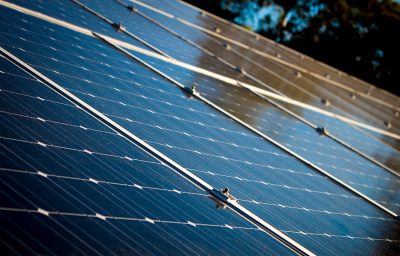Front Porch Blog
Special to the Front Porch: Our guest today is Alex Arnold, Project Coordinator with the Western North Carolina Energy Cost-share Assistance Program, giving us a snapshot of a new program offered by French Broad Electric Membership Corp. members. It was originally published May 5 on the program’s website.
French Broad Electric Membership Corporation (FBEMC) has a new policy regarding residential renewable energy generation. This post is an effort to clarify how it works, and to help members of FBEMC decide whether going solar is right for them.
(By the way, WNC energyCAP has energy grants for farmers and small businesses in the FBEMC territory which can improve the return on a solar system investment on FBEMC to be upwards of 17% [6 year payback], but systems which are connected in any way to residential energy use are disqualified from those grants. This article is simply an effort to clarify the utility’s new policy for its residential customers. If you are a farmer or small business interested in grant funding for solar or other energy-related farm improvements, please get in touch with us!)
But first…
A quick plug for energy efficiency, the Jan Brady of home energy investments:
Remember that having a more energy efficient home should be the first step to lower energy costs and lowering your carbon footprint. Insulation measures, air sealing, energy efficient appliances and behaviors make an immediate impact and pay themselves back much more quickly than a solar system. Plus, if you do decide to go solar, the system you’ll need will be much smaller and less expensive once your home is more energy efficient. Solar’s new and neat, but it shouldn’t always be Marsha, Marsha, Marsha.
FBEMC currently offers on-bill financing only for mini-split heat pumps, meaning FBEMC pays for the installation and the homeowner pays it back on their monthly bill (which is lower due to the energy savings). Other utilities in Appalachia have successfully added things like insulation and HVAC improvements to their on-bill financing programs. If you would like to see FBEMC offer similar programs, check out Appalachian Voices’ efforts to bring this energy savings solution to FBEMC.
What is On-Bill Financing?
Campaign for On-Bill Financing for French Broad EMC
Quick Basics of Solar PV
First, for some practice with throwing around watts and KWs (power units, kind of like water pressure) and kilowatt-hours (kWhs, energy units, like the gallons of water), let’s look at the numbers for a residential solar system that would produce the amount of energy consumed by the average U.S. household:
- The average U.S. home uses ~11,000 kWh/year of electric energy (~$115/month on FBEMC)
- In western North Carolina, it would take an 8 KW system to generate that number of kWhs over a year. (assuming an installation roughly south-facing and in full sun from 9AM-3PM.)
- That system would consist of about 30 panels.
Keep in mind that your ideal grid-connected system (from an economic payback perspective) may not be one that generates 100% of your use. Just because you sized a system to match your full use doesn’t mean you’ll get all your energy for free from then on. You still have to think about how the utility pays and charges you for all the electrons flowing different ways. I will discuss that later, but for now, let’s think about that 8 KW system and how much it would cost to install.

How much does a solar system cost these days?
Still a big investment. But much cheaper than even a few years ago, and still falling. As of May 2017, $2.50-$3.00 per installed Watt is a competitive installation cost to expect from an installer in our area. (A list of area installers can be found on our installers page.) So for that 8 KW system mentioned above, the cost would be around $20,000-$24,000 (8 KW x 1,000 Watts/KW x $2.50-$3.00/Watt). Many residential installations opt for smaller systems that do not offset the home’s entire electricity use.
Financing: Contact Carolina Farm Credit or Self-Help Credit Union in Asheville to ask about Solar loans. Or call us about grant funding for farm/business systems that are not tied to a residence.
Aren’t there tax credits for solar, or are those gone?
The NC State tax credit expired in 2015. The Federal tax credit (30% of system cost) is available through 2019 (and then drops some percentage points each year for a few years after). So if you installed that 8 KW system for $20,000, you would be eligible for a $6,000 credit (not a deduction) toward your federal taxes owed. If you do not owe $6,000 in a single year of taxes, you can carry over the credit to future years.
So…what’s the return on my investment?
Yes, I’m getting there in more detail below, but for now, basically: 25-30 years (3-4%) without the tax credit, and 12-25 years (4-8%) with the tax credit.
Do I need to build a system that generates all of my electricity?
If you are going off-grid, yes. And if you want electricity at night or on cloudy days, batteries will be necessary if you are off-grid.
This article, though, is about the payback of having a system connected to the FBEMC grid without batteries, where FBEMC still sells you electricity during the times when your solar system isn’t carrying your full load. For that type of system, your payback depends a lot on how FBEMC pays you for the extra electricity you generate and put on their grid. There are three different rate structures offered by French Broad for such systems. Each has pros and cons, and your best payoff might be a system that’s smaller than your needs.
First steps toward solar PV
To talk to French Broad EMC about their requirements to go solar, contact Sam Hutchins at 828-649-2051 (or email sam.hutchins [at] frenchbroademc.com ).
For a list of solar installers to connect with, visit WNC energyCAP’s installers page.
To connect with us about grant funding for farms and small businesses, email WNC energyCAP at info [at] energycap.org or call 828-649-5115.
I hope this was helpful. Good luck!
PREVIOUS
NEXT
Related News

Leave a comment
Your email address will not be published. Required fields are marked *

